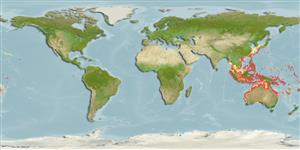Common names from other countries
Teleostei (teleosts) >
Gobiiformes (Gobies) >
Gobiidae (Gobies) > Gobiinae
Etymology: Gobiodon: Latin, gobius = gudgeon + Greek, odous = teeth (Ref. 45335).
More on author: Valenciennes.
Environment: milieu / climate zone / depth range / distribution range
Ecology
Marine; reef-associated; depth range 0 - 70 m (Ref. 86942), usually 0 - 2 m (Ref. 89972). Tropical; 38°N - 33°S, 94°E - 165°W
Pacific Ocean: Philippines to the Society Islands, north to southern Japan, south to Australia (including Rowley Shoals, Western Australia) and Tonga.
Size / Weight / Age
Maturity: Lm ? range ? - ? cm
Max length : 4.5 cm SL male/unsexed; (Ref. 48637)
Dorsal spines (total): 6 - 7; Dorsal soft rays (total): 10 - 11; Anal spines: 1; Anal soft rays: 8 - 9. Characterized by dark brown body color and lighter brown to reddish head with five vertical blue lines; young fish with additional vertical lines on body; absence of scales; complete pelvic fin frenum and basal membrane; depth of body at level of pelvic fins 2.6-2.9 in SL (Ref. 90102).
Facultative air-breathing in the genus (Ref. 126274); Found in groups among branches of Acropora coral (Ref. 9710, 48637); a coral-commensal species (Ref. 72446). Feeds on small invertebrates and zooplanktons (Ref. 89972). Monogamous (Ref. 52884). The male takes care of eggs deposited on a coral branch (Ref. 32163). Has the ability to change sex in both directions to favor reproductive success (Ref. 32163).
Life cycle and mating behavior
Maturities | Reproduction | Spawnings | Egg(s) | Fecundities | Larvae
The male takes care of eggs deposited on a coral branch (Ref. 32163). Has the ability to change sex in both directions to favor reproductive success (Ref. 32163). Monogamous mating is observed as both obligate and social (Ref. 52884).
Myers, R.F., 1991. Micronesian reef fishes. Second Ed. Coral Graphics, Barrigada, Guam. 298 p. (Ref. 1602)
IUCN Red List Status (Ref. 130435)
CITES (Ref. 128078)
Not Evaluated
Threat to humans
Harmless
Human uses
Tools
Special reports
Download XML
Internet sources
Estimates based on models
Preferred temperature (Ref.
115969): 24.9 - 29.3, mean 28.5 (based on 2143 cells).
Phylogenetic diversity index (Ref.
82804): PD
50 = 0.5000 [Uniqueness, from 0.5 = low to 2.0 = high].
Bayesian length-weight: a=0.01995 (0.00906 - 0.04395), b=3.01 (2.83 - 3.19), in cm Total Length, based on all LWR estimates for this body shape (Ref.
93245).
Trophic level (Ref.
69278): 3.4 ±0.5 se; based on size and trophs of closest relatives
Resilience (Ref.
120179): High, minimum population doubling time less than 15 months (Preliminary K or Fecundity.).
Fishing Vulnerability (Ref.
59153): Low vulnerability (10 of 100).
